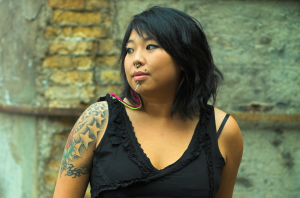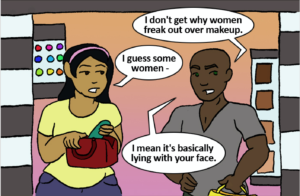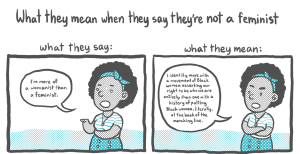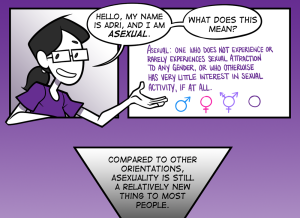I’m gonna be honest with you:
I love the idea of love. I love loving people. I love observing love. I love thinking about love. I love problematizing how love is viewed in our society.
I love the idea of practicing love all year around, but I also love the idea of having one, special, specific day designated to love.
And that special day could be Valentine’s Day. But at the moment, there’s so much wrong with how society approaches February 14th thatI just can’t get down with it.
For starters, a lot of the discourse around Valentine’s Day is super heteronormative. This means that it perpetuates the idea that certain kinds of relationships are more “normal,” natural, and desirable than others.
Specifically, it means that Valentine’s Day celebrations focus on heterosexual, monogamous romantic relationships. It also promotes the idea that romantic and sexual relationships should be something that everyone aspires to – an idea which marginalizes aromantic and asexual people.
Think about it: advertisements, movies, media, discussions, and products focusing on Valentine’s Day seldom include queer or non-monogamous relationships. And when they are included, they’re often included in a way that makes them seem like a novelty.
There’s another huge issue with Valentine’s Day: The way it’s celebrated is super capitalistic. Like most holidays, it’s very commercialized.
And in light of the above, many of you may ask: Is it possible to navigate Valentine’s Day in a way that doesn’t promote kyriarchal, oppressive ideas? Is it possible for us to take this day to celebrate love itself and not a warped idea of what love “should” be?
So I’ve come up with a few ideas for celebrating Valentine’s Day in a socially conscious, responsible way – for all of you who love love, but not heteropatriarchal capitalism so much.
1. Practice Self-Love
Everyday Feminism has published a lot of articles about self-love and self-care – and for a good reason.
Self-love is incredibly important, and it’s a particularly radical act for marginalized people. For marginalized people, existing in a world that tries to make you invisible is a radical act. Dedicating time to self-preservation in order to survive is a form of activism in itself.
It’s absolutely essential to give yourself the love society denies you and to replenish your soul with the care you deserve.
If there was any day of the year where we should dedicate special time and resources to self-love, why shouldn’t it be Valentine’s Day?
You could take time doing small things that make you feel good, like taking bubble baths, making yourself some delicious food, reading, or crafting.
Or you could take this time to plan and commit to creating a long-term self-care routine.
It’s important to remember that self-care doesn’t have to involve spending obscene amounts of money on yourself.
As the talented Yrsa Daley-Ward once aptly wrote, “romance your damn self.”
If we’re rethinking Valentine’s Day to be about love in all its forms, take time to show some love to the most important person in your life: you.
2. Rage Against the (Capitalist) Machine
Capitalism.
It sucks, am I right?
As I mentioned, one of the things I hate about Valentine’s Day is that it’s so commercialized. It’s turned into a way to manipulate people into spending money in the name of love.
The problem with commercializing something associated with love is that we subconsciously conflate the ability to buy with the ability to love. In a world where economic equality is far from a reality, it’s exclusionary to perpetuate this idea.
It’s also incredibly materialistic that we conflate buying power with love. Society often perpetuates the idea that spending money on someone is the only way to show love, and many of us know that’s not the truth.
But most of us still internalize that painful message: If you don’t spend money on someone, you don’t truly love them.
On a broader scale, it links to the idea of poor people being less complex, less capable of emotion – all in all, less human than middle-class people.
This Valentine’s Day, be subversive. Curb the impulse to spend tons of money in the name of commercialized love.
Some of you might want to avoid buying anything at all. Good on you!
But if you still want to give gifts on Valentine’s Day, you could make them yourself. Handmade presents – cards, knitted gifts, home-baked goods, and so on – are always really sweet. Also, crafting and DIY is fun and really good for your mental health!
If you really want to buy something, try buying from local, small, socially responsible businesses – preferably those who are owned by marginalized people.
Instead of buying flowers from a chain supermarket, buy it from a street vendor or another small business owner. Buy cupcakes from a local baker instead of regular, store-bought chocolate. Rather than watching a movie at the theatre, attend a local concert play that benefits a community art center or something similar.
Instead of a (possibly expensive) night out, have a night at home. If you’re able to, try to buy food or ingredients from a small, ethically run business and eat at home.
This way, you’re using your money to support those who are particularly harmed by capitalism.
I recently spoke to a couple who have been together for nine years. Instead of spending money on each other every Valentine’s Day, they have a tradition where they donate money to worthy causes. They work out more or less what gifts, dinners, and movies will cost them and donate the same amount of money to a different organization or individual each year. On Valentine’s Day, their “surprise” is finding out which cause the other has donated to.
If you’re in the financial position to do so, making a donation in the name of your loved one can be an excellent (and socially conscious) alternative to buying teddies and chocolates!
3. Engage In Community Work (Instead of an Overpriced Romantic Dinner)
In many ways, work is love made visible.
When I use the word work here, I’m not necessarily referring to employment. I’m talking about dedicating time and energy to helping a cause or a group of people.
If you can, it could be a great time to show love for your community. Communities can be amazing resources of healing, support, advice, kindness and love – and they can also be microcosms of our society, demonstrating inequality and injustice.
Serving our communities is important as it means we can lovingly help others. Consider doing some community engagement work – possibly with your loved ones – instead of going on a date.
It’s important to remember that the best way to help people is to ask how they need to be helped.
Contact local NPOs, state service centers, shelters, and community centers and ask how you can help. They might have pre-existing programs for you to participate in, or you and a few friends could organize something to help them source whatever they need.
Get creative and ask your community how you can help.
A book drive for your local children’s library? A day spent walking and playing with animals from a shelter? A litter clean-up of a local beach or park? Baking some treats and giving them to a nearby shelter for the homeless? Collecting care packages for a rape crisis center?
Like many people, I’m generally wary of doing once-off forms of volunteering, as they often don’t lead to sustainable change. Don’t simply do community work without thinking deeply about the effect of your actions. But some of the options above might be good ways to give back to your community.
It’s also important not to approach volunteering with a savior complex. That is to say that we shouldn’t participate in community work because we want to feel needed by, or superior to, our fellow community members. Often, we have the view that we’re “saving” people by helping them, which is very harmful and condescending.
And we definitely, definitely should not engage in community work as a way of showing off to others. The point of your work shouldn’t be to benefit you – it should primarily be benefitting other people.
Community engagement always needs to come from a place of love – a love that centers on the needs and livelihood of those who benefit from the work.
4. Celebrate All Forms of Love
Valentine’s Day focuses overwhelmingly on celebrating romantic love. And this feeds into the idea that romantic love is the most important kind of love that there is.
Think about it: When someone says “true love,” we infer that they’re talking specifically about romantic love.
The thing is that there are an infinite number of ways to experience love. We can have love between platonic friends, family members, and even neighbors, classmates, and co-workers.
Plenty of people love others without being romantically attracted to them, but it doesn’t make that love less true!
Valentine’s Day can be a great time to celebrate friendship, close family relationships, and other kinds of loving relationships.
Send your sibling a loving note to remind them how much you appreciate them. Go out for dinner with your best friends. Visit your grandparents for tea. If you have children in your life, maybe you’d like to take them to the beach, park, or movies. Give small gifts to your closest co-workers or neighbors.
Let’s challenge the idea that romantic love is the most important, truest form of love that there is by celebrating all forms of love. Let’s think deeply about the importance and beauty of non-romantic relationships.
5. Take Time to Reflect On Your Relationships
We should regularly take time to think deeply about our relationships. Valentine’s Day could be used as a reminder to set aside time for reflection and introspection.
Once again, I’m not just referring to romantic and sexual relationships. I’m also talking about your relationships with friends, family members, co-workers, classmates, neighbors, and acquaintances.
Is there someone you’d like to be close friends with, but you’ve never gotten around to asking them to hang out? Perhaps there’s a friend you haven’t had a good conversation with in a while. Why not take Valentine’s Day to reach out to them?
Maybe a relationship of yours is becoming toxic and difficult to navigate. It might be time to let go of it.
It could be that you have unresolved issues with some of your loved ones. Maybe you should resolve to communicate with them about it as soon as possible.
As I said, using Valentine’s Day as a day to recenter love and relationships can be a really important and really radical act.
What better way to spend it than to figure out how to make your relationships healthier and happier?
6. Don’t Celebrate It At All
Of course, it’s always an option to avoid celebrating Valentine’s Day altogether.
There’s an expectation that the holiday should be celebrated by nearly everyone in our society.
In that light, treating Valentine’s Day like every other day – and practicing love all year round – can be a radical act in itself!
***
Valentine’s Day can be tricky to navigate in a feminist way – but it’s totally possible!
Whether you choose to abstain from all celebrations, or whether you want to change the heteronormative and commercialized way we currently celebrate the holiday, remember to be conscious of what love means and how important love is in an oppressive society like ours.
May you have a fantastically subversive February 14th!
[do_widget id=’text-101′]
Sian Ferguson is a Contributing Writer at Everyday Feminism and a queer, polyamorous, South African feminist who is currently studying towards a Bachelor of Arts majoring in English and Anthropology. Originally from Cape Town, she now studies at Rhodes University in Grahamstown, where she works as vice-chair of the Gender Action Project. She has been featured as a guest writer on websites such as Women24 and Foxy Box, while also writing for her personal blog. Follow her on Twitter @sianfergs. Read her articles here.
Search our 3000+ articles!
Read our articles about:
Our online racial justice training
Used by hundreds of universities, non-profits, and businesses.
Click to learn more





















